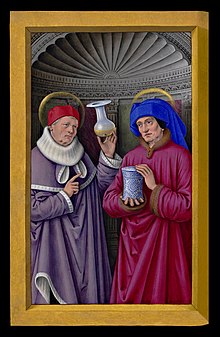Sts. Cosmas and Damian
| Saints Cosmas and Damian | |
|---|---|

Icon of Saints Cosmas (left) and Damian (right)
one holding a urine bottle and the other a medicine box |
|
| Martyrs | |
| Born | c. 3rd century Arabia |
| Died | c. 287 Aegea, Roman province of Syria |
| Venerated in |
Roman Catholic Church Eastern Orthodox Churches Oriental Orthodox Churches Eastern Catholic Churches |
| Major shrine | Convent of the Poor Clares in Madrid, Basilica of Saints Cosmas and Damian in Bitonto, Bari, Italy |
| Feast |
|
| Attributes | depicted as twins, beheaded, or with medical emblems |
| Patronage | surgeons, physicians, dentists, protectors of children, barbers, pharmacists, veterinarians, orphanages, day-care centers, confectioners, children in house, against hernia, against the plague. |
Saints Cosmas and Damian (Greek: Κοσμάς και Δαμιανός, Kosmás kai Damianós; Latin: Cosmas et Damianus; died c. AD 287) were reputed twin brothers, physicians, and early Christian martyrs. They practiced their profession in the seaport of Aegeae, then in the Roman province of Syria.
Accepting no payment for their services led to them being named Anargyroi (from the Greek Ανάργυροι, "the silverless" or "Unmercenaries"); it has been said that, by this, they attracted many to the Christian faith.
Nothing is known of their lives except that they suffered martyrdom in Syria during the persecution of the Emperor Diocletian. According to Christian traditions, the twin brothers were born in Arabia and became skilled doctors. Saladino d'Ascoli, a 15th century Italian physician, claims that the medieval electuary known as opopira, a complex compound medicine used to treat diverse maladies including paralysis, was invented by Cosmas and Damian. During the persecution under Diocletian, Cosmas and Damian were arrested by order of the Prefect of Cilicia, one Lysias who is otherwise unknown, who ordered them under torture to recant. However, according to legend they stayed true to their faith, enduring being hung on a cross, stoned and shot by arrows and finally suffered execution by beheading. Anthimus, Leontius and Euprepius, their younger brothers, who were inseparable from them throughout life, shared in their martyrdom.
Their most famous miraculous exploit was the grafting of a leg from a recently deceased Ethiopian to replace a patient's ulcered or cancerous leg, and was the subject of many paintings and illuminations.
...
Wikipedia
